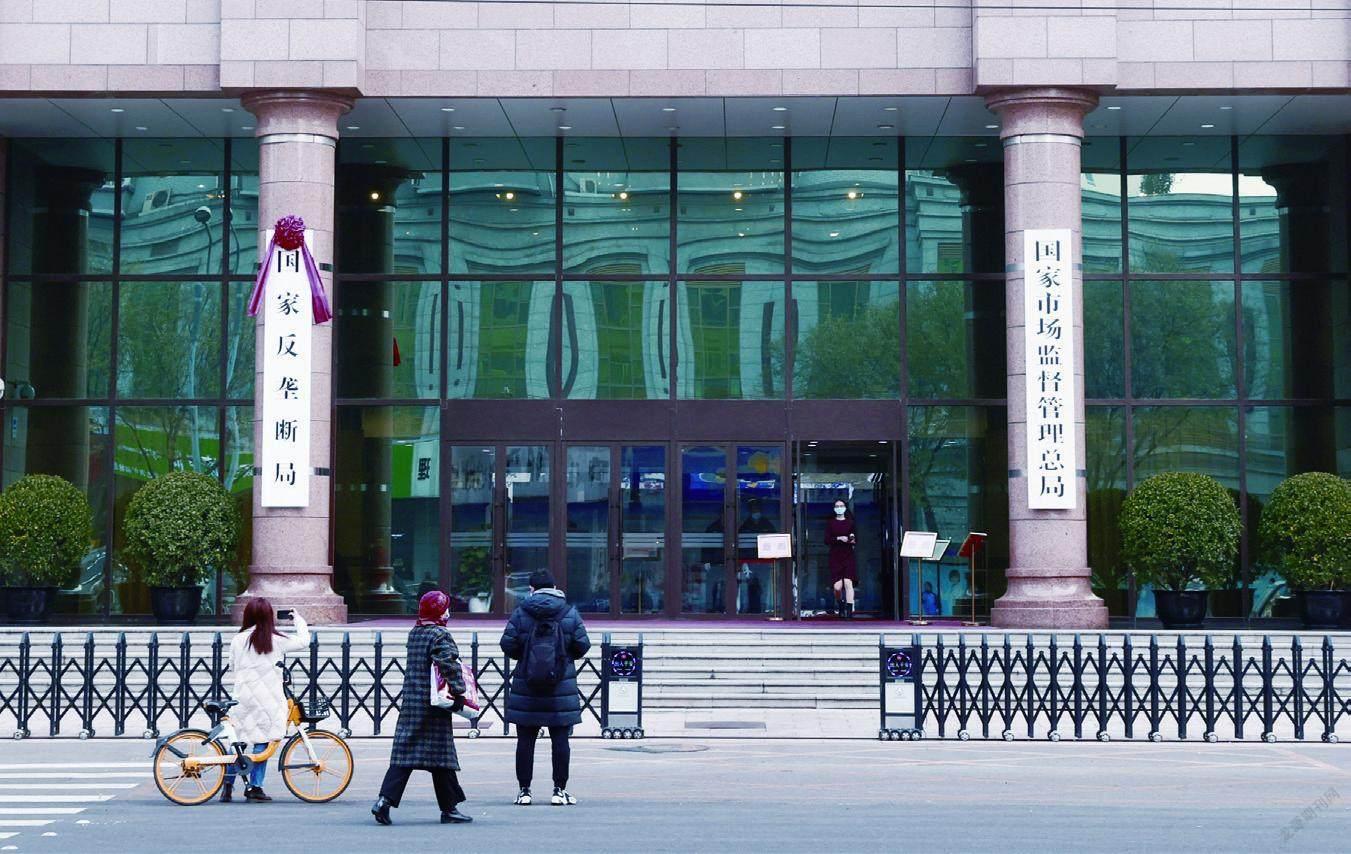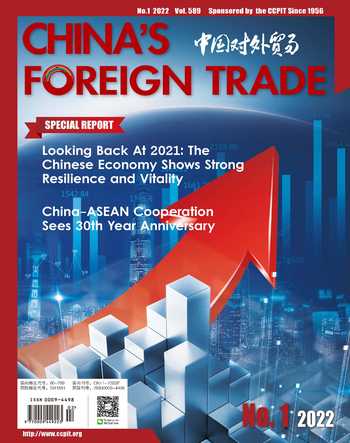Strict Measures Taken to Tackle Monopolization
By Lily Wang
The year 2021 was a special year in China’s anti-monopoly history — Legislation made new progress, and the draft amendment of the anti-monopoly law passed initial approval.
The administration of justice has been enhanced. The supreme court made it clear that it is seeking to improve the judicial review of monopolies and unfair competition, strengthening anti-monopoly trials involving Internet platforms, and introduce the judicial interpretation of anti-monopoly civil litigation in due time.
The normalization of law enforcement continues to strengthen the legal supervision of the platform economy, prevent the disorderly expansion of capital, promote the healthy and sustainable development of the platform economy, and promote the formation of an efficient, standardized and fair domestic unified market.
On November 18, 2021, the National Anti-monopoly Bureau was inaugurated. During the whole year last year, the anti-monopoly bureau reported 118 anti-monopoly administrative punishment cases, more cases than in previous years and almost equal to all cases of the past six years (2015 to 2020) combined.
The Internet sector as a key focus
On January 5, the official website of the Anti-monopoly Bureau of the State Administration of Market Supervision published 13 administrative punishment cases, a total of 13 cases, involving Tencent Holdings Co., Ltd. (hereinafter referred to as“Tencent”), BiliBili Co., Ltd. (hereinafter referred to as “BiliBili”), Alibaba(China) Network Technology Co., Ltd. (hereinafter referred to as “Alibaba”) and Jiangsu Jingdong Bangneng Investment Management Co., Ltd. Tencent was involved in 9 cases, Alibaba involved in two cases, and BiliBili and JD were involved in one case each. According to the investigation, the above cases violated Article 21 of the Anti-Monopoly Law of China due to illegal declaration of concentration of business operators and being evaluated of having no effect of excluding and restricting competition. The enterprises involved in the relevant cases were fined RMB 500,000 each.
Among the 118 administrative punishment cases in 2021, 93 cases were related to the illegal declaration of concentration of business operators, including Tencent, Alibaba, Bytedance and other internet enterprises. The earliest case can be traced back to 2011, when Tencent acquired 10% of Cheetah Mobile’s shares. Tencent did not submit a declaration before completing the equity delivery on July 7, 2021. Ten years later, on July 6, 2021, the State Administration of Market Supervision made a judgement to pun- ish Tencent for this matter.
Why has the number of anti-monopoly fines has increased in recent years? Liu Xu, special researcher of the National Strategy Institute of Tsinghua University, said that the main reason is that the supervision of the concentration of business operations has not been in place in the domestic internet sector for a long time, leading to a large number of companies violating the rules of declaration of concentration of business operators. “Article 48 of the current anti-monopoly law, which was promulgated on August 30, 2007, sets a low upper limit of punishment for unlawful declaration of concentration of business operators. Also, there are no cases in which business operators have been split up due to unlawful declarations of concentration, and some companies are more inclined to accept fines and implement the concentration of business operators if there is unlawful declaration, especially in the internet sector.”

On November 20, 2021, the State Administration of Market Supervision had reported 43 cases of unlawful declaration of concentration of business operators, relating to many key merger and acquisitions. For example, the case of Alibaba Investment Co., Ltd. acquiring the equity of Gaode Software Holding Co., Ltd; the case of Tencent Holding Co., Ltd. acquiring transferred equity; the case of Taobao China Holdings Co., Ltd. acquiring the equity of ele.me; the case of establishing a joint venture by Beijing Xiaoju Intelligent Automobile Technology Co., Ltd. and BYD Automobile Industry Co., Ltd; the case of Taobao China Holdings Co., Ltd. acquiring the equity of Sun Art Retail Co., Ltd. The time period ranged from 2012 to 2021.
In terms of the amount of the fines, the 13 cases of unlawful declaration of concentration of business operators in early 2021 were fined RMB 500,000 for each case. Although this amount is small, it is already highest possible fine as per the anti-monopoly law.
Liu Xu said that in many anti-monopoly administrative punishment cases, internet enterprises were fined the upper limit of RMB 500,000, which shows the determination of law enforcement agencies to create a competitive environment. This is because “after the internet oligarchs implement M&As without accepting anti-monopoly investigations according to law, it is often inevitable that they will take advantage of their leading or dominant positions in the market to raise the charges against downstream enterprises and consumers, or take some measures to exclude competitors, thus lose the motivation and sincerity to improve service security.”
“Effective market competition can prevent internet start-ups from becoming ‘unicorns’ in the short term, and also prevent investors behind from making quick money, like gaining dozens or hundreds of times of investment returns in several years. Effective market competition can also prevent internet oligarchs from controlling the market and harming consumers’ rights and interests through disorderly over-expansion.” At the same time, Liu Xu suggested that the anti-monopoly law enforcement agencies shall disclose information about case reporting, filing and investigation progress, to improve the transparency of anti-monopoly law enforcement, prevent insider trading, protect the interests of investors and guide reasonable expectations.
Dual focus on regulation and development
In August, 2021, Han Wenxiu, deputy director of the Office of the Central Leading Group for Financial and Economic Affairs, stressed that strengthening anti-monopoly and anti unfair competition laws is an important regular work of the Chinese government. In view of monopoly and disorderly expansion of capital, “we shall pay equal and close attention to both regulation and development.”
The 2021 Central Economic Working Conference held in December 2021 stressed that anti-monopoly and anti unfair competition should be strengthened to ensure fair competition through just supervision; also, the conference proposed “correctly understand and grasp the characteristics and rules of behaviors of capital” and “set up ‘red and green lights’ for capital, strengthen the effective supervision of capital according to law and prevent the savage growth of capital”.
For anti-monopoly supervision in 2022, Huang Yong, member of the expert advisory group of the Anti-monopoly Commission of the State Council and Director of the Competition Law Center of the University of International Business and Economics, said that normalization work means that the construction of relevant systems should continue, the transparency of law enforcement and the professionalism of the team should be further improved, and the regulatory force should have a dynamic understanding of the development of new business and new economy. With continuous improvement and perfection of the system, it is expected that the market’s predictability of regulatory policies will also be improved in the future.
Huang Yong said that in the process of promoting the construction of anti-monopoly supervision system, we shall put equal focus on regulation and development, which means regulation and development shall be intermingled, and simply prohibiting all or no regulating shall be avoided. The regulation shall serve for better development, to improve the market competitiveness of enterprises and enhance the vitality of market entities.
Wang Hao, professor of economics of the National School of Development of Peking University, said that China has particular advantages in its internet industries, and the ultimate goal of anti-monopoly work is to promote development. He believes that the future trend is to strengthen supervision and ensure compliance-based development of internet enterprises. By strengthening in-advance supervision, we can avoid taking regulatory measures after an accident occurs, which is more conducive to the fair competition and healthy development of the whole industry.
Wang Hao suggested that we should look at the anti-monopoly of the internet industry from a global perspective, including the development trend of digital economy and digital platform. We shall optimize the supervision and law enforcement on the basis of fully mastering the rules of industrial development. Secondly, the goal of supervision is to promote development, and it is important to guide the digital platform to form a sound environment for competition and cooperation under the framework of internet ecology and digital economy. That is to say, to achieve competition and cooperation at the same time.
- China’s foreign Trade的其它文章
- Looking Back At 2021:The Chinese Economy Shows Strong Resilience and Vitality
- CCPIT Work Meeting 2021 Is Held Virtually in Beijing
- Joint Effort to Resolve Disputes in Intellectual Property Rights
- Six Industry Opportunities As A Result of Population Change
- Demands for Coal-fired Power Will Reach New High
- IDC’s Top 10 Predictions on China’s ICT Market In 2022

